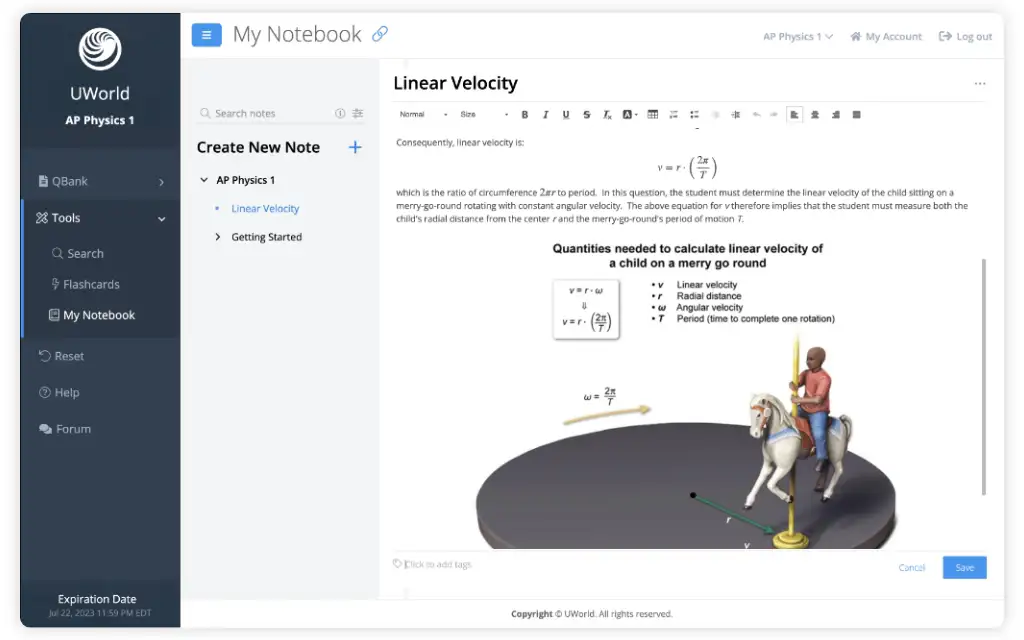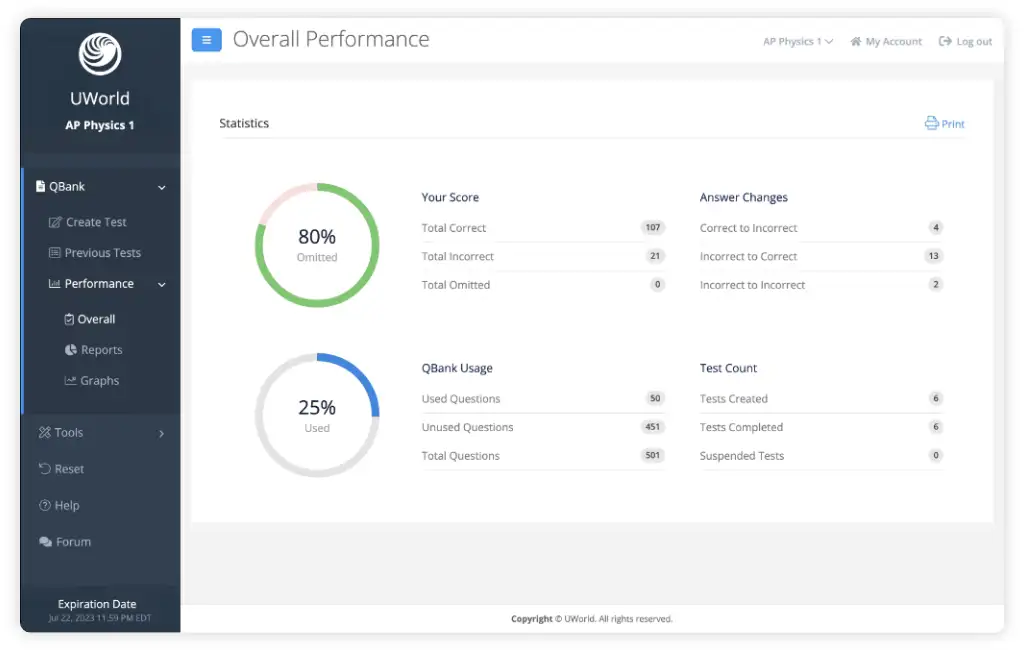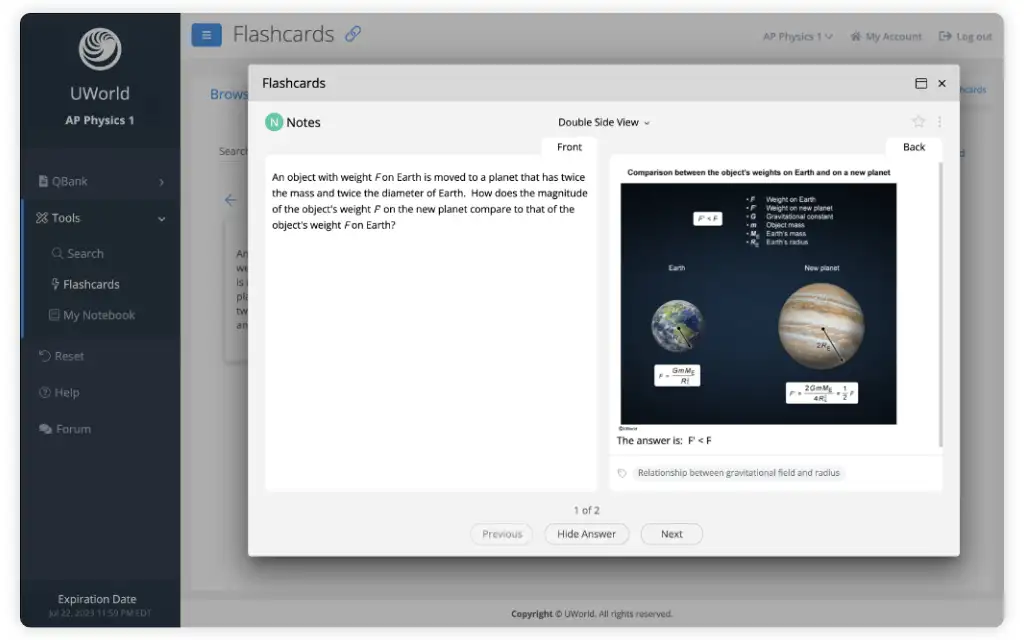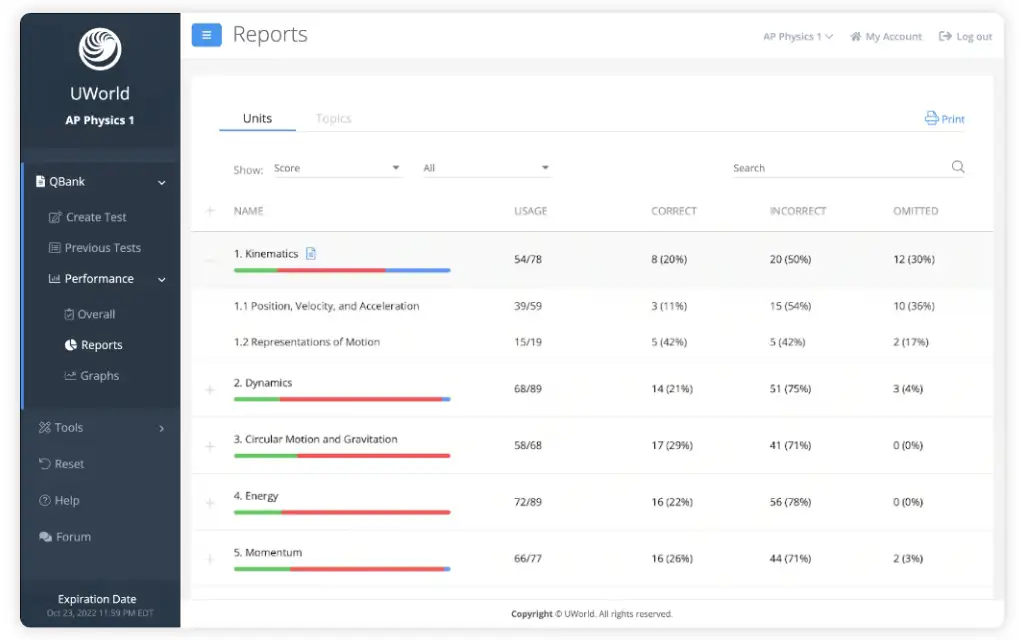AP® Physics 1 Study Plan & Tips
The Key To Score A 5 on the Exam
Are you planning on taking AP® Physics 1 in the future? If so, having a solid plan in place early in the game can help relieve stress and set you up for success. We created a detailed AP Physics study plan covering study tips, resources, and strategies to help you get the highest score possible for acceptance into your dream college. While many variables are involved in scheduling AP courses, we will provide important tips that will help you understand and complete the process seamlessly.
- What AP courses does your school offer?
- What can you do if an AP course you want to take isn’t offered at your school?
- What are the prerequisites for the AP courses you’re interested in?
- Which AP courses make sense for you to take simultaneously?
- How motivated are you, and how much time do you realistically have for studying and homework?
- Which online communities can you connect with as you progress through your AP courses?
- Know what to expect on the AP Physics 1 exam
- Don’t waste valuable time in class
- Create an organized set of high-yield virtual notes
- Work hard during the labs and engage in scientific thinking
- Reinforce class instruction and labs with online video lectures for difficult concepts
- Practice with AP-level questions that have in-depth explanations
- Know what AP Physics 1 questions look like and master all question types
- Use an online study platform with performance-tracking features
- Make flashcards and use spaced repetition technology to test your knowledge levels
- Keep testing yourself on concepts you are getting wrong
- Create a study group with your peers
- Take mock exams under realistic testing conditions
- Make a checklist of all the things you should bring on exam day
- On the day before the exam, avoid cramming and take some time to relax
- On exam day, eat properly and take your mind off your concerns
- Use techniques to reduce exam-day anxiety

Section I: Plan your AP Course Schedule Carefully
If you are considering AP courses and exams in the future, implementing a clear strategy early on can relieve stress and prepare you for success. Below are some critical questions and answers to consider as you start planning your AP course schedule:
1. What AP courses does your school offer?
First, schedule a meeting to speak with your school counselor. They will be able to help you plan your course schedule while taking into account your strengths and weaknesses.
Next, check to see if your high school has an online course catalog because it can be a great source of information. While your school might offer specific AP courses every year, some courses could be taught in a single semester.
Another great planning strategy is creating a list of all the courses you want to enroll in for each of your remaining high school years. Start with a plan for next year and expand that plan further into the future as you finalize decisions. Then, check your school's AP calendar to determine if the semester and year you want to take the course align with the school’s actual AP calendar.
2. What can you do if an AP course you want to take isn’t offered at your school?
You can find a list of all secondary schools and online schools offering AP courses online at the College Board® website. This list is referred to as the AP Course Ledger, which allows users to search for AP courses by subject and location.
Homeschooled students, or those who choose to self-study for AP courses, will need to make arrangements at schools offering the AP exams. The College Board requires schools to order exams by November 15 each year, so contact the school where you prefer to take the AP exam as early in the school year as possible. Make sure to ask for the school's AP Coordinator, as they are responsible for ordering exams.
3. What are the prerequisites for the AP courses you’re interested in?
You will likely need to complete prerequisite courses before signing up for AP courses at your high school. According to the College Board, students should take a geometry1 course before taking AP Physics 1 and be currently enrolled in an Algebra II class. Double-check with your school’s counselor and course catalog to ensure you have planned the necessary preparatory and concurrent courses accordingly.
Before you enroll in AP courses, which require a high degree of critical thinking and a large time commitment, prepare yourself for the rigor. Pre-AP courses, such as honors courses, can help to lay the foundational concepts and time management skills that will be key to your success on AP exams.
4. Which AP courses make sense for you to take at the same time?
This depends on your strengths and weaknesses, as well as how the AP courses are offered and taught at your school. You will likely find that certain courses will take significantly more time outside the classroom than others. Consider this when planning your course schedule, and avoid combining too many time-intensive subjects in the same semester or year.
5. How motivated are you, and how much time do you realistically have for studying and homework?
Be honest with yourself, and don't overextend beyond your comfortable limits. Typically, it's better to master a few subjects at a time to avoid time management issues that may lead to a poor understanding of one (or all) your subjects.
Particularly, if your goal is to take an AP science course, understand that students often underestimate how much time each course can take. This is especially true for courses requiring both homework and lab reports (such as AP Chemistry, AP Biology, and AP Physics 1).
If you have a job or other personal commitments (e.g., playing school sports or participating in an after-school club), then you need to ensure that you’ll have adequate time available to commit to an AP science class. Not only will this help you to do well, but it will also prevent you from feeling overburdened, which could have a negative impact on all your classes and activities. By preparing your course schedule thoughtfully, you’ll be able to maintain a positive, determined attitude.
For motivation, make sure to check out the AP credits offered through your top-choice colleges and universities. This information is typically found on college websites, but you also have the option to use the convenient search engine offered by the College Board, called the AP Credit Policy Search.
This tool will allow you to look up the name and address of the college you are interested in. Further, it can tell you the minimum AP score accepted by a given university and even give you a breakdown of minimum AP scores for each campus (if the university has more than one campus). Understanding this information in advance is important for planning your AP path and will help you maximize all the possible benefits at your disposal.
6. Which online communities can you connect with as you progress through your AP courses?
Connecting to online communities related to your AP course is highly beneficial. For example, the AP Students subreddit or the subject-specific Quora space relevant to your AP course are excellent resources. If you are taking AP Physics 1, both the AP Physics 1 Quora Space and APStudents can be searched for specific questions. You’ll find students who have already taken (or are currently taking) AP Physics 1, as well as AP Physics teachers, tutors, and content experts.
Take the time to evaluate the information you find on social media carefully. While these are excellent places to explore, any answers you get must be verified by an authoritative source (e.g., a website sponsored and maintained by an educational institution or other official entity). You will still be able to share your thoughts, opinions, and experiences on these platforms with other students throughout the course, and you can also get constructive feedback and encouragement.
As you plan your future courses and AP exams, talk to other AP students from your school and ask for their advice. You will be able to gather much of the information you need about each course, such as the homework requirements, the grading system, the teacher’s style of teaching, and the typical class routine. Lastly, do not be afraid to meet and speak with current or former AP teachers. They will appreciate your proactive efforts and be impressed by your initiative. Ask them about the courses they teach and how best to prepare.
Section II: Maximize your classroom experience in AP Physics 1
Students taking AP Physics 1 must be prepared for a challenging course. Aside from mastering the new concepts, students will also learn to reason logically, analyze research data, and make connections across multiple disciplines. In 20232, only about 9% of exam takers who took the AP Physics 1 exam earned a score of 5 ("extremely well qualified"). One of the main difficulties in scoring a 5 on the exam is mastering AP-style questions. Many students aren't accustomed to analyzing data and applying their knowledge. Fortunately, this AP Physics 1 study plan will provide you with the tips and materials to plan the steps necessary to do just that!
1. Know what to expect on the AP Physics 1 exam
Hopefully, your teacher will explain the format of the AP Physics 1 exam as the year progresses and may even mimic that format in their grading and testing. By becoming familiar with the type and style of questions given on the exam, you will gain confidence in your test-taking ability. However, if your teacher does not explain the specifics of the AP Physics 1 exam, you can still familiarize yourself with the format of the exam and its grading by reading the AP Physics 1 Units, Topics, and Key Concepts. Here, you will find a descriptive list of AP Physics 1 concepts and skills that are tested on the exam and the various question formats in which they appear.
The AP Physics 1 exam currently contains 50 multiple-choice questions (MCQs), of which 45 are either discrete questions or question sets, and five are multi-select questions in which two answer options are correct.
Additionally, there are five free-response questions (FRQs):
- One involving experimental design
- One including a qualitative/quantitative translation
- One paragraph argument, and
- Two short answer questions
Starting in Fall 2024, the College Board will implement revisions to AP Physics 1, which will take effect in the 2024-25 school year. These revisions include removing multi-select MCQs, reducing the number of FRQs from 5 to 4, and making adjustments to the curriculum and exam format.
The more you know about the format of the test and the nature of questions asked on it, the more relaxed you'll feel on test day. The AP exams are administered in May every year. Find out the exact test date of the AP Physics 1 exam and mark your calendar with that date and time so you will have a clear goal to work towards.
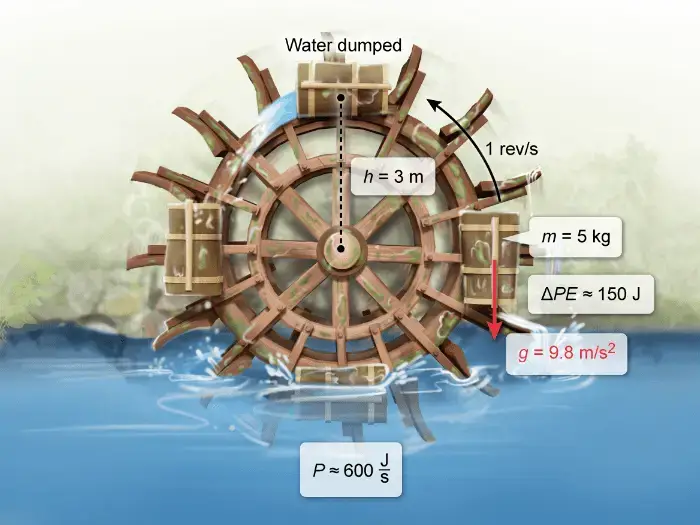
2. Make the most of valuable time in class
A great AP Physics 1 study tip is to manage your time effectively. Time is a valuable resource, so use it wisely! This includes your time spent in class. Paying attention and being engaged while in class will increase your learning. Use critical thinking to understand the material being presented in class, ask for clarification when something doesn’t click for you, and participate in class conversations with your classmates and teachers.
The AP Physics 1 material can be challenging, but strive to complete every assignment you’re given with your best effort, even if a concept is tough. In addition to assignments, your teacher may give midterm or final exams, which could present unexpected challenges and potentially result in a lower grade than anticipated. For this reason, doing your best on class assignments can not only lead to a higher final grade but also serve as a buffer against any unforeseen difficulties impacting your overall grade.
Finally, engage with your teacher and your classmates. Group study sessions offer a great chance to improve your understanding by both teaching and learning with classmates. Helping someone else comprehend complex concepts is a great way to confirm your own understanding of these concepts, as well.
3. Create an organized set of high-yield virtual notes
If you're taking notes during class, be sure to do so carefully and systematically. For each statement your teacher makes, confirm that you truly comprehend it as you write it down. After class, copy your notes into a virtual notebook of AP Physics 1 study material to keep track of them in a more organized way.
Make sure that your virtual notes are interactive and organized; add visual elements and create a system to remember concepts in the future (e.g., mnemonics and acronyms). Develop a chart that will enable you to look for connections between the topics you are studying now and those you have already learned.
If you're still uncertain about your understanding of a concept after going through and organizing your notes, go back to class and get assistance from the teacher. By utilizing a virtual notebook, you will be able to add charts, graphics, and flashcards to your notes, which will be immensely helpful in the creation of an AP Physics 1 preparation guide.
4. Work hard during the labs and engage in scientific thinking
According to the College Board, teachers in AP Physics 1 should allocate at least 25% of in-class time to lab work. The reason for this standard is that the AP Physics 1 exam requires students to be able to analyze data and form logical conclusions through scientific thinking. By regularly practicing lab skills and “doing science,” your proficiency will increase, and you will gain confidence in the lab-style exam questions that will inevitably be present.
The College Board has also developed a lab manual containing seven inquiry-style lab activities for AP Physics 1. For home-schooled students or students who self-study, the manual is a great example of the format of labs and the critical thinking skills necessary to tackle them. However, if you're enrolled in AP Physics 1 at your high school, your teacher might design several personalized labs to enhance your lab skills. In any case, labs will offer the concepts, knowledge, and skills relevant to any AP Physics 1 exam review guide, including the ability to think through design choices when planning a physics experiment from scratch. You may need to complete laboratory reports to answer questions or present your findings to the class.
You will learn to create experiments, which involves choosing the correct equipment, collecting the necessary data, and identifying the mathematics required to determine the relationship between physical quantities. Furthermore, you must be able to explain your reasoning in paragraph-length responses. Without a strong foundation in lab work, earning a 5 on the AP Physics 1 exam can be very difficult. Therefore, one of the most critical things you can implement into an AP Physics 1 study plan is to apply your best effort in lab settings and take diligent notes.
Section III: Set up a regular study schedule and use the best prep materials to master AP Physics 1 concepts
Much of the material covered in AP Physics 1 builds on topics that were learned previously. For example, the concept of momentum (from Unit 5 of the AP Physics 1 course) cannot be fully understood without a clear comprehension of forces and Newton’s laws of motion (from Unit 2). Thus, it’s important to ensure you truly grasp the critical concepts at every step along the way with progressive knowledge checks.
The AP Physics 1 exam content is cumulative, and because it’s a college-level course, the class progresses quickly. To that end, it is very important to set up a realistic schedule that allows you to create and use an AP Physics 1 study plan (not just do Physics 1 homework) on a regular basis. Students preparing throughout the school year should begin by allocating about an hour a week to videos, practice questions, and flashcards, either solo or with a group.
| 6 Months | 3 Months | 1 Month |
|---|---|---|
|
|
|
Here are some great ways to use your study time effectively:
1. Reinforce class instruction and labs with online video lectures for difficult concepts
If you struggle to understand concepts learned in class, or if your teacher has been unable to help you, try exploring AP Physics 1 study materials, such as videos. Focus on videos that explain concepts you need help understanding better. As you watch, concentrate on understanding the logic behind each concept. Try AP Physics 1 study materials like Khan Academy, Bozeman Science, and the College Board for useful study tips. Furthermore, if you are self-studying for AP Physics 1, you can use these videos instead of class lectures!
2. Practice with AP-level questions that have in-depth explanations
Utilize practice questions that provide clear details and reasoning for each answer choice provided. Ideally, the solutions to these practice questions should include the background needed to answer the questions correctly and have graphics and visual aids to help you improve your retention of the information.
One great way to gain an immediate advantage in your AP Physics 1 exam preparation is to use educational visual aids. The explanations provided for each answer choice should walk you through the conceptual reasoning step by step, showing you how to arrive at the correct answer and explaining why the incorrect answers are wrong. Educational illustrations can be beneficial in supercharging your learning experience. To see what these explanations look like in the UWorld Question Bank, check out the next point of discussion.
3. Know what AP Physics 1 questions look like and master all question types
To prepare for MCQs, utilize practice problems that mimic the formats given on the official AP Physics 1 exam, such as those including text, diagrams, data tables, graphs, and calculations. See an example of question types - multiple-choices questions and free-response questions from our UWorld question bank.
Additionally, you should practice formulating written responses to FRQs. On the College Board website, you can find study materials and previous AP Physics 1 exams with sample student responses and scoring guidelines for FRQs. By understanding the important aspects of FRQ-style questions, you’ll become confident in what’s expected from your written responses, which is essential to scoring a 5 on the AP Physics 1 exam. When practicing for FRQs, use a timer to restrict yourself to the suggested time per question, and then grade your answer with the given guidelines. Ideally, find a friend in class to prepare and grade with so that you can discuss possible misconceptions together.
By immersing yourself in high-quality practice MCQs and FRQs and rigorously timing and grading your attempts, you will develop your ability to quickly interpret the various formats to arrive at the correct answers.
4. Use an online study platform with performance-tracking features
You should track your performance on the practice questions from each unit. For MCQs, track your performance by using both AP Physics 1 Content and the Science Practices:
Content:
AP Physics 1 has about 90 unique sub-topics. To master the course, you’ll need to track your performance in each sub-topic. You can find a list of these sub-topics in our AP Physics 1 Unit Guide, which will give you a full outline of the course and its content. Master each of those sub-topics, and you will ace the AP Physics 1 exam.
Science Practices:
The AP Physics 1 exam also tests students’ ability to perform science-related skills. To do this, the College Board uses a set of important skills called science practices.
The MCQs and FRQs of the AP Physics 1 exam require mastery of both the sub-topics and the science practices. Therefore, it’s crucial to keep track of your proficiency in each science practice in addition to your sub-topic comprehension. This will allow you to identify the science practices and the specific types of skills within a science practice with which you struggle. With this knowledge, you can focus on improving these areas.
When using past AP Physics 1 exams to practice, monitor your performance with respect to the content and the science practice as you self-grade by using the scoring standards from the College Board. Identify specific sub-topics or types of questions that you find especially difficult so that you can spend more time on these.
Be on the lookout for common mistakes as you study the science practices provided in the AP Physics 1 study materials. Specifically, be aware of the typical difficulties that arise when analyzing visual information, creating graphs/tables, performing mathematical calculations, and reasoning scientifically.
| Science Practice | What you have to do for a question using this Science Practice |
|---|---|
| Modeling | Use models and representations to explain scientific phenomena and problems. |
| Mathematical Routines | Utilize mathematical techniques to describe physics situations and interactions appropriately . |
| Scientific Questioning | Engage in questioning and critical thinking to guide investigations. |
| Experimental Methods | Plan and implement strategies to collect and analyze data in relation to scientific questions. |
| Data Analysis | Perform mathematical calculations to analyze and interpret data as evidence. |
| Argumentation | Develop and justify scientific arguments using evidence and theories. |
| Making Connections | Relate knowledge across various scales, concepts, and representations between many domains. |
5. Make flashcards and use spaced repetition technology to test your knowledge levels
As you dive into new concepts, your overall knowledge will develop. Some ideas will become familiar to you with little effort, while more complex concepts may be more difficult for you to understand. Throughout your learning experience, group these AP Physics 1 exam concepts into categories in which your comprehension level is either high, medium, or low.
In areas where you feel your understanding is on the low or medium end, create flashcards with all the content covered in those areas, and focus on those practice questions that cover similar science practices and format. Read through the explanations provided for the correct and incorrect answers. Even if you answer a question correctly, the actual reasoning for the correct answer may be different from what you originally thought.
In any case, do not become complacent with content you know well. Rather, you should continue to test yourself regularly to confirm mastery right up to the AP Physics 1 exam. Keep using technology and other tools to refresh your memory related to your high-knowledge concepts. For example, use a flashcard generator with spaced repetition technology, which adapts to your strengths and weaknesses.
Just how does this spaced repetition technology help you? Spaced repetition shows you flashcards with difficult concepts more frequently until you master them. After a certain time, these concepts are shown less frequently to promote long-term retention. While all the concepts being studied remain in the flashcard deck, they will show up with varying frequencies that depend on your mastery of the content. This is extremely beneficial! Find AP Physics 1 study materials that allow you to make these kinds of virtual flashcards.
6. Keep testing yourself on concepts you are getting wrong
After you have gone through a sizable number of practice questions and you have made a flashcard library, you may want to consider focusing on the more difficult practice questions covering the content (or question type) with which you have had the most trouble. This process of reviewing and re-assessing, called remediation, is critical to mastering the course content fully and helping you score a 5 on the AP Physics 1 exam. Once you have finished remediating, you can be confident that your AP Physics 1 study plan is nearly complete.
However, don’t get too comfortable! Your strengths still need to be regularly assessed and reinforced to maintain a mastery of the concepts, even as you improve your weaker areas. This will help to keep your memory of exam content from diminishing.
Search for online AP Physics 1 study materials that give you access to remediation tools in addition to general exam-style practice questions. The idea is to retain a high level of knowledge and comfort such that you can sit confidently through your AP Physics 1 exam and ace it.
7. Create a study group with your peers
Another possible option to add to your AP Physics 1 exam review is to establish a study group with like-minded classmates. Be mindful that your group focuses on disciplined study and does not lead to distractions as a social gathering. Your study partners should share your goals and passion for acing the test.
While you continue to utilize flashcards and AP-style questions to study, consider asking each other questions about difficult concepts. Additionally, you can grade each other’s FRQs and discuss any issues or misconceptions. By holding each other accountable and staying focused, you can help each other achieve your goals.
8. Take mock exams under realistic testing conditions
As the exam date draws nearer, about 1-2 months beforehand, be sure to mimic the testing conditions you will encounter. Ensure that your AP Physics 1 study plan focuses on mock exams with realistic time constraints.
For a full-length test, this means that you should attempt to complete 50 MCQs within 90 minutes. Then, after a 10-minute break, you should begin working through 5 FRQs that match the style given on the exam (3 long and 2 short) within 90 minutes. Use your break time the same way that you would if you were sitting for the real exam. Have a quick snack, drink some water, or use the bathroom as necessary to ensure the next 90 minutes have as few distractions as possible. After the 10 minutes have elapsed, return to your mock exam as if you were in the real testing room.
The College Board’s testing policies do not allow students to bring food or drink (including bottled water) into the exam testing room. However, with the proctor’s permission, you may leave the testing room during the break to eat a snack or get a drink. Create a reminder to bring snacks and drinks with you on exam day.

Section IV: Feel confident on exam day
1. Make a checklist of all the things you should bring with you on exam day
For the MCQ section of the AP Physics 1 exam, you will need No. 2 pencils and erasers. On the FRQ section of the exam, you will need blue or black pens. You can also bring a straightedge or ruler to the AP Physics 1 exam and an approved calculator (4-function, scientific, or graphing). Don't forget to bring something to eat and drink during your break. Lastly, dress comfortably and bring removable outerwear if the room temperature is too hot or cold.
2. On the day before the exam, avoid cramming and take some time to relax
Do not give in to the temptation to pack last-minute details into your schedule; instead, concentrate on finding ways to make sure that you are properly prepared for the test. Try to clear your mind by taking a walk or performing some other light activity. Get a good night's rest by turning off all screens early and preparing for bed on time. Be prepared for pre-test anxiety by using relaxation techniques such as taking a warm bath or drinking some caffeine-free tea.
3. On exam day, eat properly and take your mind off concerns
Have a good breakfast on test day because your brain needs nutritious fuel to function properly! Don't overeat, and avoid anxious jitters by steering clear of excessive amounts of caffeine. Moreover, try to avoid foods that contain too much sugar because this will only elevate your blood glucose levels for a short time, followed by a sharp decrease, which can be detrimental to your performance on the exam. To further combat stress, consider taking a stroll or engaging in other light physical exercises.
4. Use techniques to reduce exam-day anxiety
It's completely normal to experience feelings of anxiety on test day, so don't be alarmed if they arise. However, there are several strategies you can use to be prepared for them:
- The last thing you want to deal with on exam day is the stress associated with being late or running into traffic. Make sure you have everything you need before leaving for the exam with the help of a checklist! Also, plan to leave earlier than usual to ensure you arrive on time (or early).
- Rest assured that you are well prepared for the exam. By sticking to a systematic study schedule, you did the heavy lifting required to be as ready as possible on exam day.
- If you struggle with test anxiety, there are multiple relaxation exercises you can use to shake it off. For example, deep breathing greatly assists in relaxing the muscles in your body. Other techniques, such as envisioning peaceful or positive situations, can help your mind relax. Your school counselor may be able to help you learn these techniques, so do not hesitate to reach out to them.
- During the exam, don't let the presence of other students around you affect your focus. Concentrate on yourself; it doesn't matter how fast or slow the other students are going.
- Keep reminding yourself of how hard you worked! Practice positive thinking, such as closing your eyes, taking a deep breath, and thinking, “I can do this!”. All your hard work preparing for the exam will pay off.
You’ve made it to the end of the AP Physics 1 Top Study Plan and Tips! Following this guide will give you the skills and tools necessary to score a 5 on your AP Physics 1 exam. Remember that the best way to prepare for the exam involves discipline, dedication, and exam-style practice problems. You can do it! Good luck!
References
1(2021). Prerequisites. About the AP Physics 1 Course. AP Central Retrieved February 12, 2024 from https://apcentral.collegeboard.org/media/pdf/ap-physics-1-course-and-exam-description.pdf.
2(2023). STUDENT SCORE DISTRIBUTIONS. AP Exams- May 2023. AP Central Retrieved February 12, 2024 from https://apcentral.collegeboard.org/media/pdf/ap-score-distributions-by-subject-2023.pdf.
